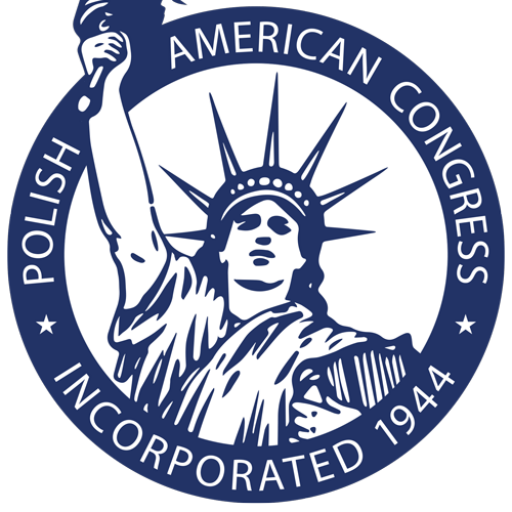Chicago’s Edward J. Moskal was born May 21, 1924, the son of immigrants. High school educated and a World War II veteran, he was the proprietor of a successful business at the time of his election in 1967 to serve as treasurer of the Polish National Alliance. At that convention Charles Rozmarek was defeated by Aloysius Mazewski for the PNA presidency. He went on to win election six times before becoming president in October 1988 in a special election following Mazewski’s death. That November he was elected president of the Polish American Congress, an office he held until his death on March 20th, 2005. He was succeeded in both posts by Frank J. Spula of Chicago.
Edward Moskal’s presidency of the Polish American Congress came at a momentous time when communist party rule in Poland was teetering towards collapse. And while his tenure was indeed controversial, Moskal went on to make a number of significant, even remarkable contributions to the PAC mission. Here the focus is on just three of them.
In October 1989 Moskal led a delegation of PAC leaders to Poland to demonstrate the Congress and the ten million strong Polish American community’s support for Prime Minister Tadeusz Mazowiecki’s newly recognized Solidarity government. It was a truly historic visit. For over 40 years Poland’s communist regime had done all it could to misrepresent or simply ignore the PAC and what it stood for. As a result, two generations of Poles learned next to nothing about the organized Polish community abroad and its commitment to Poland’s freedom and well-being. Indeed, Moskal went on to be a frequent and widely interviewed visitor to free Poland. He became closely associated with Wspólnota Polska, the Polish institution working with the vast Polish diaspora. He was even invited to address the Polish Senate. Through his efforts, the Polish American Congress became widely known in Poland.
Two, Moskal played a lead role in the PAC’s successful effort to win Poland’s entry into the NATO alliance. This extraordinary lobbying work began in 1993 and continued into 1998, when the U.S. Senate voted, and by a margin of 80-19, to amend the NATO treaty to approve the admission of Poland, the Czech Republic and Hungary into the Alliance. Significantly, 21 of the 24 senators from the states where the Polish community was largest and the PAC best organized voted in favor of NATO expansion.* In 1999, the 50th anniversary of the Alliance, the heads of all 16 NATO member states met in Washington, DC to welcome its three new members.
Three, in 2002 Moskal’s representative, PAC Executive Director Les Kuczynski played a lead role in winning billions of dollars in reparations from the German businesses that had exploited the labor of hundreds of thousands of Poles in World War II. Of this amount, over $52 million was awarded to more than 4,100 Poles residing in the U.S. and Canada.
In all these and so many other endeavors, Moskal and his predecessors, Charles Rozmarek and Aloysius Mazewski, worked with other dedicated PAC members to realize the mission of the Congress. In Rozmarek’s time, one might note the efforts of Roman Pucinski, Frank Dziob, and Karol Burke; during Mazewski’s presidency, Jan Nowak-Jezioranski, Kazimierz Lukomski, and Andrzej Ehrenkreutz; and in Moskal’s years Myra and Casimir Lenard. Nor can one forget the many PAC activists who were officers and activists in the Polish Roman Catholic Union, Polish Falcons of America, Polish Women’s Alliance, PNA, and smaller fraternals, the leaders of the Polish veterans associations, those in the clergy, and the men and women in the press and mass media. And even they represent but the tip of what in fact was a great iceberg.**
Donald Pienkos
Donald Pienkos is a Professor Emeritus at University of Wisconsin-Milwaukee.
*On Moskal, the PAC and NATO expansion, see Donald Pienkos, “Witness to History; Polish Americans and the Genesis of NATO Enlargement,” Polish Review (Fall 1999, pp. 329-337); and Les Kuczynski, ed., Expansion of NATO: Role of the Polish American Congress (1999).
** For more on Edward Moskal, see Dr. Pienkos’ histories of other Polish National Alliance (1984, 2008) and the Polish American Congress (1991) and the many entries in James Pula, ed., The Polish American Encyclopedia (2011).
Are you interested in exploring this topic further? Would you like to support the advocacy work of the Polish American Congress? Please donate by clicking below:
